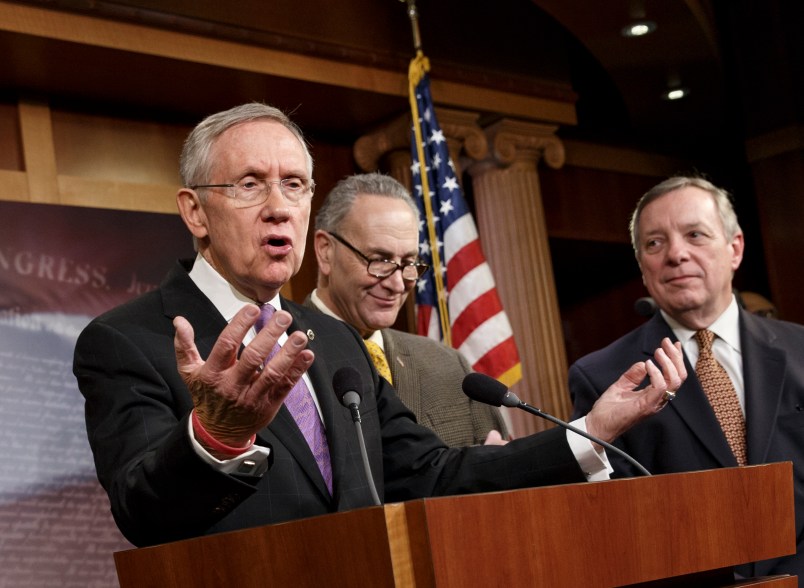Their majority in jeopardy, Senate Democratic leaders are gearing up to confirm a swath of President Barack Obama’s nominations in the lame duck session.
“We will definitely move a lot of nominees during the lame duck one way or the other — possibly more if Republicans take the majority,” said a Democratic Senate leadership aide.
The aide expressed confidence that Democrats would retain control of the Senate, but speculated that due to the “bleak prospects for confirmation under a Republican majority, there will be a strong incentive to get as many confirmed during the lame duck as possible.”
The calendar is tight. The Senate is scheduled to return on Nov. 12, the week after the election. The next Congress convenes on Jan. 6, when Democrats will either have a narrower majority than the current 55 members, or surrender it to the Republicans. (Congress must also pass a new government funding bill by Dec. 11 to avoid a shutdown.)
Norm Ornstein, a congressional scholar at the American Enterprise Institute, said, “It would be crazy if [Senate Majority Leader Harry] Reid did not call them back as soon as possible and go into long hours, night and day, to process as many confirmations as he can.” But he cautioned that doing so “will inflame Republicans and drive them absolutely batshit.”
A top priority for nominations will be to confirm Eric Holder’s successor for U.S. attorney general before Republicans consolidate their gains in January, several top Democratic aides say. A White House official recently told TPM that Obama will announce a nominee after the election, in early or mid November.
A second Democratic leadership aide said the Senate will probably also push through some judicial nominations and “a handful of ambassadors.”

Senate Minority Leader Mitch McConnell, R-Ky., and GOP lawmakers, from left, Sen. John Barrasso, R-Wyo., Sen. John Thune, R-S.D., and Senate Minority Whip John Cornyn, R-Texas, face reporters. (AP Photo/J. Scott Applewhite)
Senate aides expect the lame duck to be particularly chaotic if the election heads to overtime — it’s plausible that the majority will be decided in a Dec. 6 runoff in Louisiana, or perhaps in another tight race. In that situation, there will be intense uncertainty and not much for senators to do other than vote on nominations.
“Nominations will play a key role in what happens during the lame duck, whether or not we lose the majority,” the second aide said. “But what the order and priorities will be and how it all play out, we really don’t know. … You won’t get a clear sense until a little ways after Election Day.”
A Republican leadership aide declined to comment for this article. The two Democratic leadership aides were not authorized to discuss strategy on the record and were granted anonymity to speak candidly.
Currently there are 156 pending nominations on the Senate floor, so only a small fraction of them will get to be confirmed in the lame duck. Senate Republicans have slowed down nominations over the last year, even the ones they support, and that’s not expected to change in the lame duck. But Democrats will need 51 votes to ultimately confirm most nominees — that task becomes harder in January even if they hold on to their majority.
Numerous forecasts give Republicans an edge to win control of the Senate. In that scenario, the likely next majority leader, Sen. Mitch McConnell (R-KY), could effectively veto any nomination by refusing to let it come to a vote on the Senate floor. The expectation is that he would scuttle some of Obama’s most progressive nominees (or those who are otherwise objectionable to conservatives), and seek to extract concessions for others.
“He certainly wheels and deals and I’m sure he’d try to figure out where his leverage points are,” the second Democratic leadership aide said. “But nobody here really knows how he would approach things. He talks a lot about wanting to restore the Senate to functionality but he’s spent years grinding the place to a halt. So, which Mitch McConnell would show up? That’s the real question.”
Russell Wheeler, a visiting fellow on governance studies with the Brookings Institution, noted that the fight against nominations has become historically unusual. Such disagreements didn’t shut down the Senate back when Presidents Bill Clinton, George W. Bush and Ronald Reagan faced a Senate run by the opposition party in their final two years.
“But we are in different territory and it may well be that the modest level of comity that held in previous sessions wouldn’t hold here,” he said. “Relations up there are so terrible.”







The mystery is why the Dems haven’t moved more quickly. The GOP would have.
Are the senate democrats that dumb to think all of sudden now they can get their nominees pushed thought without republican obstruction. Democrats should have been pushing all along. Now all republicans have to do is wait out the clock.
The only answer I got is their democrats
Judges, judges, judges. Republican conservative Chief Justice John Roberts has pleaded with the senate to get some more judges confirmed. That’s all the political cover Dems need.
Let’s get some qualified judges confirmed in bulk – binders full of judges – asap!
NO !!!
Phew, tough job today
going back to vacation, need rest before next big decision which will require phonecalls and repeating NO over and over again with a few threats just to make sure it’s NO.